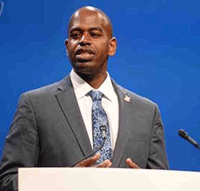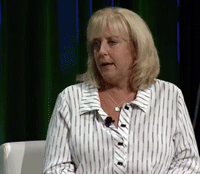In her keynote speech, AFT President Randi Weingarten (right) offered a stinging critique of the agenda of federal education chief Betsy DeVos and other backers of privatization. She also offered a path forward to both resist the attacks on traditional schools and reclaim the promise of public education for all children to meet their needs and aspirations.
“The moment we’re in is the result of an intentional, decades-long campaign to protect the economic and political power of the few,” Weingarten told conference attendees in Washington, DC. “It has taken the form of division—expressing itself as racism, sexism, classism, xenophobia and homophobia. And its intentions are often disguised,” she added.
Weingarten’s comments referred to the parallels between the history of school ‘choice,’ which is rooted in segregation, and today’s push for taxpayer-funded vouchers. The term decades ago was used to cloak overt racism by segregationist politicians like Harry Byrd, who launched the opposition to the Supreme Court’s Brown v. Board of Education decision.
Click here for more on the history of public education privatization.
“So as far as I’m concerned,” Weingarten said, “the only choice is: Do we as a nation strengthen and improve our public schools, or don’t we?”
Weingarten outlined what works to create great schools—investment in and focus on the four pillars of powerful, purposeful public education: children’s well-being, powerful learning, educators’ capacity, and collaboration.
Click here to watch Weingarten’s full keynote speech.
Among the conference highlights was a series of brief speeches by members who recently sought and, with the help of their unions, won elected office in their local communities.
 “It’s great that we write, call, sign petitions, but we also have to run for office,” veteran educator and state Representative Joshua Hall (left) told the TEACH crowd. “And when we run on our values, we win,” added Hall, who currently serves as first vice president of our AFT Connecticut-affiliated Hartford Federation of Teachers.
“It’s great that we write, call, sign petitions, but we also have to run for office,” veteran educator and state Representative Joshua Hall (left) told the TEACH crowd. “And when we run on our values, we win,” added Hall, who currently serves as first vice president of our AFT Connecticut-affiliated Hartford Federation of Teachers.Hall shared the foundation of his successful against-the-odds campaign earlier this year for an open seat representing the North End of the capital city in the legislature. He explained how, despite losing the Democratic Party’s endorsement, the backing of the Connecticut Working Families Party (WFP) and union members from across the state put him over the top.
“The big piece that the doubters didn’t understand is that ‘labor is your neighbor’,” Hall said to cheers from the audience. “I’m proud of what we fight for. We fight for dignity and a voice at work. We fight for the things our communities deserve,” he added.
Click here to watch Hall’s full conference speech.
Another union leader from Connecticut took the stage during the conference to participate in a plenary session on the transformational power of teacher professionalism. A veteran educator and president of our Meriden Federation of Teachers added her voice to a panel that explored avenues to support powerful learning and to develop frontline staff capacity.
 “Collaboration is very intentional,” Erin Benham (right) told the crowd when asked to describe the role of unions in assuring that teachers have the time, knowledge and support needed to succeed. “It is not something that came overnight. Many districts forget that professional learning for our teachers needs to be there — and that the benefits will be great for our students,” she added.
“Collaboration is very intentional,” Erin Benham (right) told the crowd when asked to describe the role of unions in assuring that teachers have the time, knowledge and support needed to succeed. “It is not something that came overnight. Many districts forget that professional learning for our teachers needs to be there — and that the benefits will be great for our students,” she added.Benham’s comments referred to how her union members and district administrators work together and incorporate effective professional development as part of their core mission.
“In Meriden, we are a part of the team — we’re not just at the table,” she said.
Describing an intentional, formalized structure that brings together her district’s top administrators, union leaders and rank-and-file members, Benham explained how staff truly collaborate on behalf of their students. She equated the approach to empowering learning in the classroom.
“The best kids learn from each other — so do our teachers,” she added.
Click here to watch the full panel discussion.
Benham and Hall, along with their Connecticut colleagues from eight affiliated local unions, exemplified the commitment to collaboration and social justice that were the hallmarks of this year’s TEACH conference. Their efforts illustrate how we’re part of a larger movement that amplifies the work we do and reaches far more people than we could ever reach alone—and vice versa.


